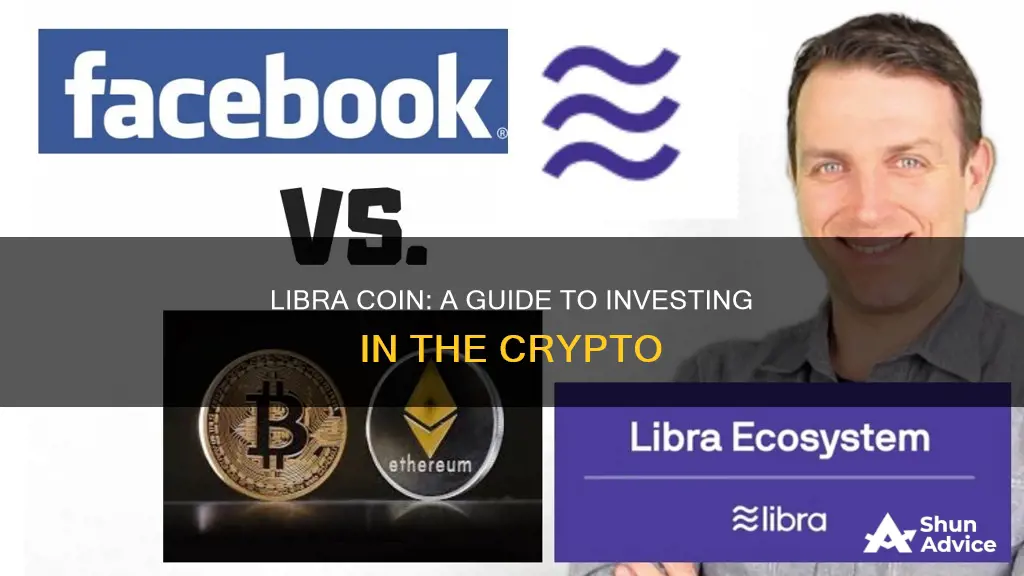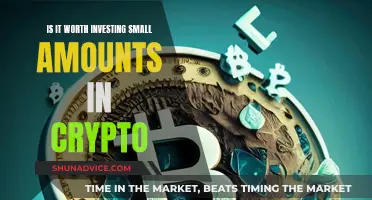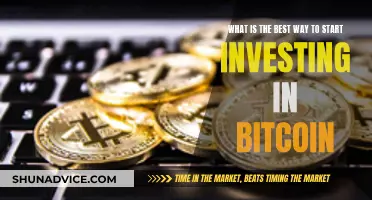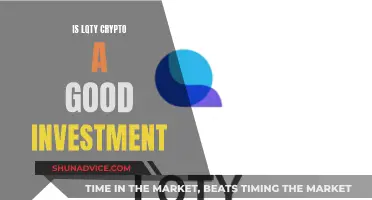
Libra is a cryptocurrency created by Facebook, which will be available to people without bank accounts or credit cards. Libra's value is tied to government-issued currency, unlike Bitcoin, and is managed by the Libra Association, a consortium of companies and foundations. To buy and exchange Libra, users will need a wallet, an app that might be integrated into other apps. While Libra is not a cryptocurrency that users can purchase to trade on the market, there are still ways to invest in it. For example, you can apply to be a member of the Libra Association, if you have $10 million and a good reason for them to include you. Alternatively, you can invest in the many businesses that will spring up around Libra support.
| Characteristics | Values |
|---|---|
| Type of Currency | Cryptocurrency |
| Similarity to Other Cryptocurrencies | A cross between Bitcoin and PayPal |
| Target Audience | People without bank accounts or credit cards |
| Value | Tied to government-issued currency like the US dollar or the Euro |
| Purchase | Not bought to trade on the market but to exchange for other currencies |
| Wallet | An app that might be integrated into other apps |
| Blockchain | Managed by the Libra Association |
| Founding Partners | 28 partners including eBay, PayPal, Vodafone, Spotify, investment firms, cryptocurrency companies, and non-profits |
| Launch Date | 2020 |
What You'll Learn

Libra is a stablecoin, linked to the value of other currencies
Libra is a stablecoin, a type of cryptocurrency with values pegged to assets such as the US dollar or gold. Unlike other cryptocurrencies like Bitcoin, which are volatile in their valuation, stablecoins aim to provide a stable, scalable, and secure means for transactions.
Libra is pegged to a basket of bank deposits and short-term government securities for a slew of historically stable international currencies, including the dollar, pound, euro, Swiss franc, and yen. The Libra Association, which governs the project, maintains this basket of assets and can change its composition to offset major price fluctuations in any one foreign currency, thus keeping the value of Libra consistent.
The value of a Libra is meant to stay largely stable, making it a good medium of exchange. Merchants can be confident that they won't be paid a Libra today that's worth less tomorrow. This stability also makes it easier to conceptualize the value of a Libra; for example, a gallon of milk in the US might cost 3 to 4 Libra, similar to its dollar value.
Libra's stability is further ensured by the Libra Reserve. Each time someone cashes in a dollar or their respective local currency, that money goes into the Libra Reserve, and an equivalent value of Libra is minted and given to that person. If someone cashes out from the Libra Association, the Libra they give back are destroyed, and they receive the equivalent value in their local currency. This ensures there's always 100% of the value of Libra in circulation, backed by real-world assets in the Libra Reserve.
Unlike "pegged" stablecoins that are tied to a single currency like the USD, Libra manages its own value, which should cash out to roughly the same amount of the cashed-in currency over time. This makes Libra more useful than any single national currency, as it can be accepted in more places with fewer complications.
Bitcoin Investment: Smart Move or Risky Gamble?
You may want to see also

It's a cross between Bitcoin and PayPal
Libra is a cryptocurrency created by Facebook, which can be accessed through apps and used to make payments or send money. In this way, it is similar to PayPal and Venmo. However, Libra is aimed at people without bank accounts, whereas PayPal and Venmo require users to have a bank account.
Libra's value is tied to government-issued currencies, such as the US dollar and the euro, and it is managed by the Libra Association, a consortium of companies that includes PayPal, Uber, Spotify, and several other large corporations. Each partner has invested at least $10 million and has a vote on group decisions.
To use Libra, you will need a "wallet" app, which may be integrated into existing apps like WhatsApp and Facebook Messenger. Facebook's wallet app is called Calibra.
Libra is not an investment vehicle like Bitcoin, where you buy it because you think it will increase in value. Instead, it is designed to be a stable currency for everyday transactions, similar to exchanging one fiat currency for another, like a dollar for a euro.
Facebook announced its plans for Libra in 2019, with an expected launch in 2020. However, the cryptocurrency has faced regulatory hurdles and scrutiny from lawmakers and has not become widely available.
Bitcoin vs. Litecoin: Where to Invest Your Money?
You may want to see also

It will be available to people without bank accounts
Libra is a cryptocurrency that was announced by Facebook in 2019 and was expected to launch in 2020. It is a digital currency that users can access through apps and use to pay for things or send money to each other. Libra is largely aimed at people without bank accounts.
Facebook's subsidiary Calibra will first introduce a digital wallet for Libra. Calibra is a company that focuses on financial services. The Libra wallet will be available in Messenger, WhatsApp, and as a standalone app. It will also be integrated into other apps, much like PayPal or Apple Pay.
To obtain Libra, users can exchange fiat currency for the digital currency through wallet apps, including Facebook's Calibra, third-party wallet apps, and local resellers like convenience or grocery stores. Facebook is also likely to carry out what is known in cryptocurrency circles as an "air drop", handing out small amounts of currency for free to kickstart the ecosystem.
Libra will be of great benefit to people without bank accounts. It will allow them to send money to family members abroad, for example, without the high fees that are currently charged for international transfers. It will also allow them to receive money in the form of Libra on their phones and spend that money as Libra.
Coinbase Index Fund: A Guide to Investing
You may want to see also

Libra transactions are handled with blockchain technology
The Libra blockchain is managed by the Libra Association, a consortium of companies that includes Facebook, Mastercard, Visa, PayPal, Uber, and many others. The Association aims to ensure that Libra transactions are faster, more accurate, and safer than existing financial technology by leveraging blockchain technology.
Each member of the Libra Association operates a "validator node" on the blockchain network. These validator nodes validate transactions according to an agreed-upon protocol, and once a transaction is validated, it is authorised and added to the blockchain. This process ensures the security and integrity of the transaction data.
The Libra blockchain is designed as a "permissioned blockchain", meaning that only certain permitted members can participate in the network. To become a member, one must meet certain requirements, including having a minimum of 10 million USD, a certain amount of computing capacity on servers, and relevance for payments. The Libra Association plans to make the blockchain accessible to everyone in the future, but the specifics of how this will work are not yet clear.
The use of blockchain technology in handling Libra transactions provides several benefits, including increased security, transparency, and decentralisation. It also allows for the elimination of trusted third parties, such as auditors, reducing costs and the potential for human error. Additionally, the decentralised nature of blockchain makes it more difficult to tamper with the transaction data.
Overall, the use of blockchain technology in handling Libra transactions is a key aspect of the cryptocurrency's design, providing security, transparency, and trust for its users.
The Future of Crypto: Bitcoin vs. Ethereum
You may want to see also

It will be easy to buy Libra
Facebook's Libra coin will be easy to buy. The Libra crypto is a cross between bitcoin and PayPal, meaning Libra will be a potentially disruptive digital currency. Facebook will make Libra available to those without credit cards or even bank accounts.
To keep and exchange Libra, users will require a "wallet", an app that might be integrated into other apps. The current plan is to let many developers make their own wallets. The wallet will be a lot like PayPal or Venmo, which are integrated into other apps.
Libra will be available on WhatsApp and Facebook Messenger, and through several other Libra partners. It will be accessible through apps to pay for things or to send money to each other.
Libra is a stablecoin, linked to the value of other currencies, unlike other cryptocurrencies like bitcoin. Its value will be tied to hard assets, including various currencies such as the US dollar and the euro.
US Coin Investments: Which Are Rising?
You may want to see also
Frequently asked questions
Libra is a cryptocurrency created by Facebook, which will be available to people without bank accounts or credit cards.
Unlike Bitcoin, Libra's value is tied to government-issued currencies like the US dollar and the Euro. This means that it is not a cryptocurrency that you buy to trade on the market, but rather, it is like exchanging a dollar for a Euro.
To invest in Libra, you will need to use a "wallet", which is an app that might be integrated into existing apps, like PayPal or Apple Pay.
Libra was expected to launch in 2020, but Facebook's COO Sheryl Sandberg has said that it is a "long way from launch".
The Libra Association is a consortium of companies and foundations, with Facebook as the driving force, that will manage the Libra cryptocurrency.







